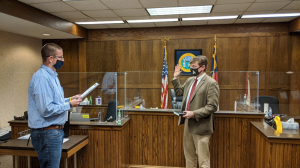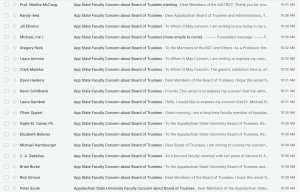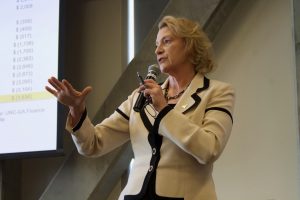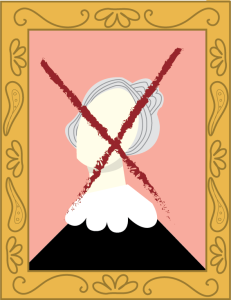Faculty Senate discusses concerns over holidays, spring semester with COVID-19
October 13, 2020
With the fall semester halfway over, the App State Faculty Senate led a panel raising new concerns: the upcoming holidays and the spring 2021 semester.
The Faculty Senate held the panel with two App State professors who have researched COVID-19: Mahram Ahmed, a research assistant professor in the department of biochemistry, and Maggie Sugg, assistant professor in the Geology and Planning Department with research on environmental illnesses.
Ahmed said that it is concerning to send students home at a time where there is an exponential growth in COVID-19 numbers, notably in the transmission rate in the community and student population.
“We will be sending them home at a time where infection rate is high, and they will then be going home to their communities and spreading it there,” Ahmed said.
While students are going home for the holidays Nov. 24 and final exams will be online with some exceptions such as lab-based and clinical classes, faculty and staff are concerned with transmission rates in the state.
One proposal was whether or not the university should send students home prior to that, which is already two weeks earlier than the originally scheduled date, Dec. 11.
There are a number of factors to consider, including the weather, the holidays where people will gather and movement around the state.
At the university level, there are a lot of decisions to be made going forward for the community’s health such as classes for next semester and when to send students home for break.
“This is an unpredictable virus and can have a long-term impact on our community,”Ahmed said.
She said a big concern of hers is students not following COVID-19 guidelines and the university not considering sending students home.
“When we send students home in November, it will be the holidays, it will be colder, they will be indoors more. We could potentially be transporting the coronavirus all across North Carolina and creating other hotspots,” Sugg siad.
Students are encouraged to quarantine and self-isolate before heading home for the break, according to Sugg.
Sugg said the university needs to remind students how important it is to isolate before returning home. She also encouraged students to social distance, wear a mask and wash their hands.
“It’s only October and we are seeing large increases in our numbers,” Sugg said. “It is likely that it will continue to increase and then we are going to bring it all over North Carolina.”
While more young people are more asymptomatic, there are still consequences,such as spreading the virus to those who are more high-risk.
False negatives are possible if the person tested is at the beginning of the infection and has not built up enough virus particles to be detected. For this reason, Sugg recommended students get tested regularly prior to returning home.
“It’s up to the university but if you look at the data and the rate of transmission, the conclusion is very clear. If you want to responsibly send students home, it’s best to do it when the rates are lower. They’re only going to increase,” Ahmed said.
Ahmed said that it is likely to see a similar trend with the influenza virus, but this is doubly concerning as it is unknown as to what those two viruses will do together.
Universities that have been successful with widespread testing have had the resources to develop their own COVID-19 testing, such as private universities with the funds to support that or universities that have medical centers associated with them.
App State has neither of those.
“I can’t advocate for students to come back or not, but I can say transmission is higher in the winter and that should be a factor that is discussed with the collaboration of admin, faculty, and the community,” Sugg said. “The more we can do to reduce our risk, the better.”















Scott VanNote • Oct 17, 2020 at 2:20 pm
There will be less transmission due to it being colder and everyone will be mostly inside. There will also be less spread of the regular flu due to the fact that more people are getting their shots and also wearing masks which will lower the spread. Let’s not put fear into people by saying we need to send them home before it gets closer. App kids and staff are doing a wonderful job thru all of this. Let’s keep up the arduous work of combating Covid-19 and push thru the semester. Maybe the Chancellor will grant some paid time off for all your efforts!!!
Lauren • Oct 17, 2020 at 10:14 am
It is the Department of Geography and Planning, not Geology and Planning.